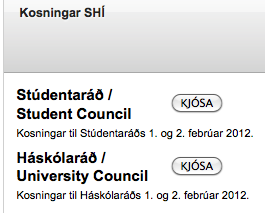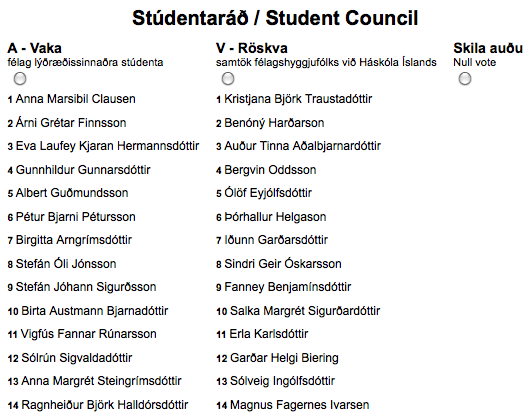Icelandic names Posted by sequoia on Feb 1, 2012 in Icelandic culture
For today and tomorrow (February first and second), voting is going on for the University of Iceland’s student council. I didn’t vote but I took some screenshots because I thought it’s a good way to teach something about Icelandic names.
“Kjósa í kosingum til Stúdentaráðs og Háskólaráðs 2012”
“Elections for Student Council and University council 2012” (the University’s own translation)

When you go to vote online (on Ugla, the University’s website only for students where you have a student Email and your course files) it looks like this.

I’m going to skip over the other parts here and talk about just the names. For last names, you can tell what gender the person is with if -son (son) or -dóttir (daughter) is at the end of their name. However, there was one time where I did see someone with the wrong ending on their name and I’ve yet to find an explanation for that, as when I searched for them (they were an old teacher at the University from a few decades ago) their name was always consistent. By the way, the laws for what you can name your children are fairly strict in Iceland, and Iceland is also really strict on changing your name. Even if you’re transgendered, you can only change your name in Iceland if you’re on hormones and have completed all surgeries, and then the regular naming laws for naming newborns apply to you as well. It used to be that foreigners who became Icelandic citizens had to change their names to Icelandic names upon gaining citizenship, but not anymore.
It’s easy to tell someone’s gender by their last name, but more often in your Icelandic textbooks they’ll only list someone’s first name. In Iceland too, you never tell someone your last name and only say your first name when introducing yourself. Even when someone’s trying to look you up in the computer or calling for your turn at the doctor’s office, they’ll only read your first name aloud. Maybe for most of the first names you can use the regular gender rules to guess at the person’s gender, along with if they sound like English names. But there are a lot of tricky ones and personally I’ve just had to memorize them.
A name with -hildur is a female name (Svanhildur, Gunnhildur, Brynhildur, Hrafnhildur, Hildur). Auður is also a female name, even though all of these end in -ur which when talking about singular nouns means the word is masculine (remember from the post about spelling that the “au” sound isn’t “a” and “u”, it’s “ö” and “i” instead, and when spelling out a name “au” is one sound instead of two letters. You’d spell this “au-ð-u-r”). -heiður is also a female ending (Ragnheiður, Heiða). Ragnheiður is feminine but Ragnar is masculine.
If “Guð” is in a word it’s probably a feminine name (Guðrún, Guðný, Guðlaug, Guðni, Guðríður, and Guðfinna, all are feminine)
The -s ending on a word means nothing. “Vigfús” is male but “Valdís” is female. To make things worse, you usually can’t look up names in the dictionary to find out what gender they are (you have to have a special naming dictionary).
What genders are Sigvaldi, Vilhjálmur, Hlynur, Sverrir, Bjarni, and Fannar? All masculine.
What about Sigrún, Herdís, Steinunn, Eydís, Arnheiður, Erla, Dagbjört, and Kolbrún? All feminine.
To make things worse, most Icelanders have nicknames that have nothing to do with their actual name, and they may or may not introduce themselves with their real name. I haven’t talked to enough people to be able to actually give you real info, but I know there’s at least this post that has some common examples. So if you meet an Icelander who’s clearly male but says their nickname is Súsan, don’t think anything of it (Yes, my Icelandic neighbour has a nickname like this).
Last, here are some common English names that have Icelandic equivalents. Even if they look the same, the pronunciation is a bit different, like “August” versus “Ágúst” which is pronounced “ow-goose-t”. You’ll find similar “English-ified” words in Icelandic on a daily basis because there is a lot of English slang in spoken Icelandic at least, but it’s a lot less common than in many other languages.
Anna, Sara, Linda, Sandra, Karen, Alexander, Alexandra, Andrea, Axel, Agnes, Anton, – (same)
John – Jón
Theodore – Theódór
Maria – María
Christine – Kristín
Margret – Margrét
Christian – Kristján, Kristinn
Johan, Johanna – Jóhann, Jóhanna
Ellen – Elín
Peter – Pétur
Steven – Stefán
Daniel – Daníel
Paul – Páll
David – Dávið
Elizabeth – Elísabet
Oscar – Óskar
Carl – Karl
Iris – Íris
Robert – Róbert
August – Ágúst (same as the month)
Thomas – Tómas
Jonas, Jhonas – Jónas
Frederik – Friðrik
Hana – Hanna
Aaron – Aron
Rachel – Rakel
Erick – Erík, Eríkur
Benedict – Benedikt
Laura – Lára
Rose – Rósa
Tina – Tinna
Helen – Helena
Christopher – Krístofer
Victor – Viktor
Jacob – Jakob
Sophia – Soffía
Matthias – Matthías
Julius – Júlíus
Rebecca – Rebekka
Jenny – Jenný

Build vocabulary, practice pronunciation, and more with Transparent Language Online. Available anytime, anywhere, on any device.
About the Author: sequoia
I try to write about two-thirds of the blog topics on cultural aspects and one-third on the language, because there's much more out there already on the language compared to daily life information. I try to stay away from touristy things because there's more of that out there than anything else on Iceland, and I feel like talking about that stuff gives you the wrong impression of Iceland.




Comments:
Ragnheiður:
I have to mention lot of names that begin with guð are male, Guðmundur, Guðlaugur, Guðbrandur; Guðni is fact one of them. I think the only rules are that all names that end in i are male and those that end in a are female except for Sturla which is male. (I don’t know why Sturla is male, it is strange)